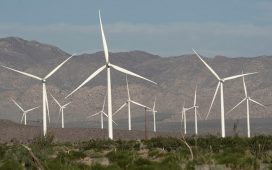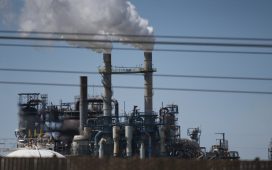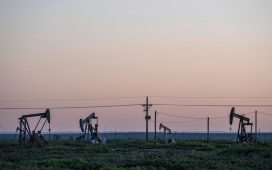
ELBOW KEY, BAHAMAS – SEPTEMBER 7: An aerial view of view of damaged boats in Hurricane Dorian … [+]
The 2019 North Atlantic hurricane season ends officially later this week. Here I am going to give you the straight scoop on hurricanes. Everything that follows is fully consistent with recent scientific assessments of the Intergovernmental Panel on Climate Change, U.S. National Climate Assessment and World Meteorological Organization. In fact, the information below comes straight out of these authoritative assessment reports.
Before proceeding, it is important to point out that hurricanes, and tropical cyclones more generally, are a big deal. They can kill in the thousands and cause hundreds of billions of dollars in damage. They deserve our attention. But when I started studying hurricanes in 1994 as a post-doctoral researcher at the U.S. National Center for Atmospheric Research, I could never have guessed that these powerful storms would be a highly politicized area of science 25 years later.
Climate change is real, and is expected to have impacts on tropical cyclones. I have long advocated for aggressive mitigation and adaptation policies and nothing below is to the contrary. In fact, I think that scientific accuracy and effective policy making go hand-in-hand.
So let’s look at a few questions and answers, on some key topics related to hurricanes and tropical cyclones more generally. In my experience, many are surprised by the information below from official databases and leading scientific assessments.
Have landfalling hurricanes or major hurricanes (those of Category 3 strength or greater) in the United States become more common since 1900?
No.
The graphs below show the data (updated from this paper, with data from NOAA). The past 14 years have seen the fewest landfalls of major hurricanes (3) of any such period since 1900. The 14 years ending 1928 saw 13 major hurricanes hit the United States.

U.S. mainland landfalling hurricanes, 1990 through 24 November 2019.

U.S. mainland landfalling major (Category 3+) hurricanes, 1990 to 24 November 2019.
Once past damage is adjusted for the presence of more people, more property and more wealth, has damage increased?
No.
Since there is no trend in hurricane landfalls, especially in the strongest storms which cause the overwhelming majority of damage, we should not expect to see any trend in damage after such adjustments. The graph below shows the data (updated from this paper).

U.S. mainland hurricane damage 1900 to 2019, normalized to 2019 values. Note 2018 and 2019 are … [+]
U.S. landfalling hurricanes are just a small subset of all North Atlantic hurricanes. Have North Atlantic hurricanes increased in frequency or intensity?
There is a strong consensus within the scientific community that available evidence does not support claims of increasing North Atlantic hurricane activity. The IPCC Fifth Assessment Report (AR5) concluded, “No robust trends in annual numbers of tropical storms, hurricanes and major hurricanes counts have been identified over the past 100 years in the North Atlantic basin.” More recently, the Geophysical Fluid Dynamics Laboratory of NOAA concluded, “the historical Atlantic hurricane frequency record does not provide compelling evidence for a substantial greenhouse warming-induced long-term increase.”
Since 1970 hurricane activity has increased in the Atlantic, but there is disagreement among consensus assessments on whether this increase is part of the normal ups and downs of hurricane activity or is beyond documented variability.
On the one hand, the US NCA concluded, “Despite the level of disagreement about the relative magnitude of human influences, there is broad agreement that human factors have had an impact on the observed oceanic and atmospheric variability in the North Atlantic, and there is medium confidence that this has contributed to the observed increase in hurricane activity since the 1970s. This is essentially unchanged from the IPCC AR5 statement.”
On the other hand, the WMO tropical cyclone expert assessment concluded: “only 1 of 11 authors agreed with the following statement: ‘the balance of evidence suggests that there has been a detectable increase in North Atlantic [tropical cyclone] activity since the 1970s’.” It will be interesting how the next IPCC report adjudicates between these differing views.
What about globally?
The most recent U.S. National Climate Assessment concluded: “there is still low confidence that any reported long-term (multidecadal to centennial) increases in [tropical cyclone] activity are robust, after accounting for past changes in observing capabilities [which is unchanged from the Intergovernmental Panel on Climate Change Fifth Assessment Report (IPCC AR5) assessment statement]. This is not meant to imply that no such increases have occurred, but rather that the data are not of a high enough quality to determine this with much confidence.”
The U.S. National Climate Assessment also concluded: “within the period of highest data quality (since around 1980), the globally observed changes in the environment would not necessarily support a detectable trend in tropical cyclone intensity. That is, the trend signal has not yet had time to rise above the background variability of natural processes.”
Of those storms that have made landfall globally, and thus present the greatest threat to people and property, the WMO tropical cyclone assessment concluded, “no detectable anthropogenic influence has been identified to date in observed [tropical cyclone] landfalling data.” The WMO team also rendered judgment on whether tropical cyclones are slowing down (and thus potentially dropping more rainfall), with 10 of 11 experts expressing “low” or “low to medium” confidence in such a trend.
How about increased tropical cyclone rainfall? The WMO “author team had low confidence that anthropogenic influence specifically on hurricane precipitation rates has been detected.” The NOAA GFDL concurred, finding that although the IPCC concluded with medium confidence that heavy precipitation had increased in some land areas, “an anthropogenic influence has not been formally detected for hurricane precipitation alone.”
So where might a role for climate change be found?
If, after reading all of the above, you conclude that the evidence base is pretty weak for the detection of changes in hurricanes or tropical cyclones or the attribution of those changes to human-caused climate change – you’d be absolutely correct.
But there are a few areas where the WMO Assessment expressed views with respect to “not concluding that anthropogenic forcing had contributed to some observed change or event in a certain direction when it had done so to a nontrivial extent.” In other words, where might there be a signal that we can’t yet detect?
For instance, in response to this question, all of the WMO team agreed that more storms are reaching category 4 or 5 intensity, versus years past, and most agreed that climate change has contributed to this increase. Most also agreed that the strongest tropical cyclones are getting stronger, with climate change one reason for this increase. All in all, the WMO team assessed 17 different questions from this perspective.
The WMO team was careful to note that “If the goal is to advance scientific understanding” achieving detection of changes and attributing them to specific causes in a rigorous, quantified manner is “logical.” But if the goal is “future planning and risk assessment” then we may indeed wish to prepare for future trends that have yet to be detected, even if that leads “to more speculative [tropical cyclone] detection and/or attribution statements that have substantial potential for being false alarms.”
Scientists expect signals of the influence of climate change on tropical cyclones to emerge at some point in the future, even if they haven’t yet.
What about all of the claims by activists and in the media about hurricanes being linked to climate change?
There are of course scientists and other experts who have views on hurricanes that deviate, sometimes dramatically, from the conclusions reached by authoritative assessments on the overall body of knowledge and evidence. Science is strong because of the diversity of methods and perspectives that are brought to bear upon important research topics, and research on tropical cyclones reflects such diversity.
But it seems that when it comes to hurricanes, it is common for activists, journalists and some scientists go out of their way to promote views that are at odds with leading assessments and to avoid placing those outlier views into the context of the careful conclusions of IPCC, U.S. NCA or WMO.
Hurricanes have come to occupy a starring role in the political theater that is climate change. As a result, sorting fact from fiction can be difficult. Fortunately, the scientific community has gone to great lengths to carefully assess what is known, what is not and what we might expect to know in the future. It is up to everyone else to decide whether to rely on those assessments or not.
Follow me on Twitter @RogerPielkeJr








